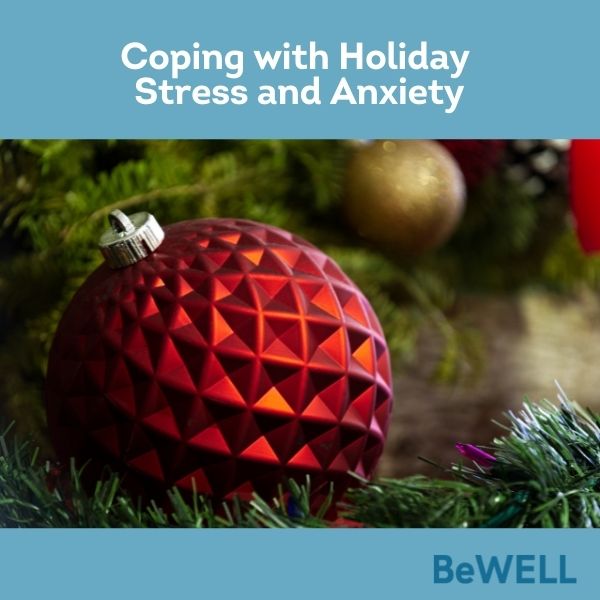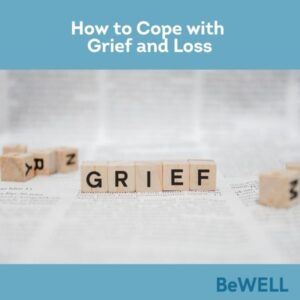As the bustling holiday season quickly approaches and what feels like an endless list of plans and tasks are at hand, many of us can feel particularly overwhelmed this time of year. Stress, anxiety, and depression symptoms often skyrocket during the holidays. With demanding schedules, extra obligations, and family gatherings, it is not uncommon to feel distressed by the whirlwind of holiday expectations. The end of the year can be a particularly stressful time, as we are inundated with New Year expectations, end of year reflection, change in our routine, and an influx of spending. You may also be feeling particularly stressed because of lingering Covid 19 anxiety, especially as you make plans to see family and friends. If you are struggling this holiday stress and anxiety this season, or feeling an increase in depression symptoms, you are not alone. A Be.Well Therapist can help you manage your emotions and prioritize your mental well being during the holiday season and all year.
Seasonal Affective Disorder
While the holiday season can be difficult for many reasons, one of the most common reasons people may find this time of year particularly challenging is the change in season. Seasonal Affective Disorder (SAD) is depression related to the change in season and is typically heightened in the fall and winter months. Shorter days and colder weather play a major role in SAD for many individuals. According to Be.Well therapist Jordan Shapiro, about 80% of her patients struggle with increased depression symptoms during winter months and nearly all of her patients who struggle with depression year round, feel an increase in their symptoms in the winter. SAD can affect individuals any time of year, but is generally more common in the late fall through the winter season. Some signs and symptoms of SAD can include:
- Change in sleep
- Change in appetite or hunger
- Feeling depressed most days
- Feeling hopeless
- Feeling sluggish or disinterested
The change in season can also change our daily schedules, which can play a major role in our mood and ability to cope with stress. Staying in doors, moving your body less, and a change in your sleep patterns may all be culminating in increased anxiety. As the weather continues to get colder, and outdoor dining comes to a halt, you may feel an increase in Covid anxiety.
Covid Stress During the Holidays
Covid 19 is still a very real concern and navigating the holidays during a pandemic is particularly stressful for some individuals. While many of us may feel more comfortable traveling and seeing family this year than last year, some individuals may still be struggling with finding a way to celebrate holidays with loved ones that feels safe and comfortable. Depending on vaccination status, or high risk family members, you may be struggling to find a safe way to celebrate the holidays this year. The key is to give yourself grace and only do what feels comfortable for you and your family.
Social Anxiety and Pressure
The holiday season can be particularly stressful for many of us, for a wide variety of reasons, says Be.Well Therapist Joran Shapiro. She believes a major root source of anxiety and uneasiness comes from the pressure of expectations. Holidays tend to carry a lot of expectations with them, from external societal expectations to family pressure, this time of year can be difficult to navigate. Victoria Rodriguez, another Be.Well. therapist agrees. She shared that many of her patients feel external social pressure and suffer from heightened social anxiety during the holiday season. Often, there is so much more to do and get done that we lose our typical routines, which can compound stress. “Running around so much during the holidays, we can forget to take care of ourselves, even the basics: sleeping, eating well, staying hydrated, and exercising.” More social expectations, things to do, places to be, and less routine can take a toll on your mental and even physical well being this time of year.
Navigating Family Dynamics
Holiday movies, every commercial on tv, and social media constantly show us what holidays “should” look and feel like. Real families are not always like the ones we see on social media and on tv, and it is easy to get wrapped up in constatnly comparing your own experiences to those that you see around you, or that you think are “normal”. In actuality, spending holidays with family can often be stressful and even trigger painful memories or trauma. Having to sit down for a family dinner, or staying in your childhood home or even sleep in your childhood bedroom can be extremely stressful.
Navigating family dynamics can feel particularly stressful during the holiday season, because we often feel forced to be around certain family members and friends that we may not feel totally aligned with. Holiday expectations may make us feel like we shouldn’t rock the boat and make the best of these situations, even at our own expense. Managing our partner’s families or divorced families can also be a source of pain and anxiety.
Ways To Manage Holiday Stress
Holidays can be stressful, but you don’t have to suffer. Here are some tips to help alleviate some of the anxiety, fear, and stress that often come along with the holidays.
-
Acknowledge your feelings
You may feel the pressure to please everyone, go to every event, and show up for family and friends who make you feel uncomfortable or anxious. The first step is to do a little self reflection and acknowledge your feelings. Sit back and think about what exactly you are feeling, so that you can start to understand your triggers. Once you know what you are feeling and where it is coming from, you can come up with ways to alleviate those stressors, or remove yourself from uncomfortable situations. Self reflection can be hard, but as Victoria Rodrigez points out, “uncomfortableness is how you make change.” Remember that your feelings are valid and your mental well being should take priority over anyone else’s expectations.
-
Set Boundaries (with yourself and others)
It may seem impossible to set boundaries with family members (or yourself when it comes to family) who don’t respect you or who have never been challenged by you, but boundary setting is the number one tool you have in your tool belt to help navigate stressful situations. Boundaries are different for each individual and for each situation. For example, if there is a topic that is off limits to discuss, you can tell your family ahead of time that you won’t be participating in that conversation. That may not work for you, so your boundary may be excusing yourself from the conversion and walking into another room if that topic comes up. Maybe you can go to your family’s house for a holiday dinner, but you cannot spend the night. That is a perfectly healthy boundary to set for yourself and those around you. Boundary setting is a way to control a situation in the best way possible. Jordan Shapiro reminds us that, “We can’t control our family’s response to us, we can only control ourselves and how we react to that response.” Setting a clear boundary and seeing it through is a healthy way to take control of your own response.
-
Stick to a routine
Find time to prioritize your mental and physical health, like sticking to a sleep schedule, staying hydrated, and moving your body. Go for a walk or listen to your favorite song for a 10 minute dance party, even if you are staying at your mom’s house. Taking even 20 minutes to yourself to move is a perfect way to de-stress, increase those feel good chemicals, and get away for a bit.
-
Find a support network (and avoid people who aren’t supportive)
We all have those friends or follow those people on instagram that make us feel worse about ourselves and our lives. Unfollow, mute, or disengage! Prioritizing your mental health means limiting things that make us feel anxious, like talking to that one friend who constantly boasts about her amazing life. Find a friend who you can talk to openly and honestly, who you feel supported by. The holidays can feel particularly lonely for a lot of us, especially if you don’t have many people to share them with. Your support network can be your church, community center, or even your gym. Identify your support network and reach out.
-
Give yourself grace
It is important to remember that your journey can fluctuate. There is no right path to becoming a healthier version of yourself, so cut yourself some slack! The holiday season can bring up old traumas and continue to push new expectations and pressures on you. Be kind to yourself. Do the best that you can today.
The holiday season is a particularly stressful time, so if you are feeling increased anxiety or depression symptoms, you are not alone and a Be.Well Therapist is here to help. With offices in both Midtown Manhattan, New York and Hoboken, as well as virtual therapy sessions, a Be.WELL. Therapist can help you ease your stress and take control of your mental well being.



